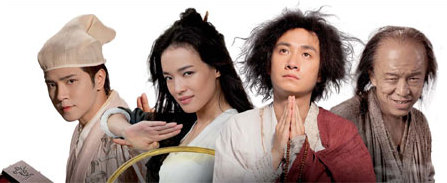Journey to the West: Conquering the Demons
|
The film still of Journey to the West: Conquering the Demons. Photos Provided to China Daily |
Gore, laughter and the feel-good factor rolled into one
Extremism has always been Stephen Chow's game: a confusingly apocalyptic amalgam of gut-wrenching laughter, equally gut-wrenching violence, and feel-good storytelling. While his movies tend to fall loosely under the umbrella of the comedic genre, the growth in intensity of violence across his films has, in recent years, had viewers wincing more and more. While Chow doesn't ever show up on screen in Journey to the West: Conquering the Demons, the elements of his directorial handiwork are clear: the linguistic puns, foot-in-mouth jokes, potty humor and increasingly ironic and grandiose CGI action sequences are all there.
Chow's comedic lineage derives from the extremes among these rich elements: language, rhythm and action. Action, this time around, is different; the hyper-violent ways in which evil dismembers its victims reveal a darker element to Chow's directorial vision - one that has, perhaps, been there all this time but reveals itself more characteristically with him behind the wheel. Babies are devoured, victims hung, skewered from meat hooks, and slaughtered by grotesque weapons. These kinds of over-the-top images serve to accentuate Chow's goal: to have the viewer simultaneously laughing, gagging and aww'ing, by the end of the film.
But Chow's films have a decidedly postmodern flavor to them, evidenced by his willingness to satirize modern stereotypes by inserting them into his films. By allowing actors to speak in their native dialects, Chow allows for a multi-ethnic cinematic vision. Actor and Shaolin Monk Shi Xingyu, playing the Fist of the North Star, a demon hunter, screams and cavorts in his rough-and-tumble, native Shandong dialect, while Show Luo (罗志祥) lisps through pretty-boy formalities with a Taiwan accent. It pokes fun at one of the most commonly misunderstood problems in modern China - the difficulty of communication. This linguistic conflict has always been an element in Chow's movies - a long-running joke that pokes fun at the diversity of tongues in Chinese society.
Even gender and sexuality in modern Chinese society seem to be an open target for Chow. Of course, all modern storytelling requires a romantic lead, and in Journey, it is Duan (Shu Qi), a beautiful and simultaneously aggressive fellow demon hunter who pays more homage to Golden Swallow, the female protagonist of King Hu's 1966 Come Drink With Me (《大醉侠》Dà Zuì Xiá), than the typical, coquettish damsel in distress.
While Chow already tackled the Chinese legend of Journey in his 1994 film A Chinese Odyssey (《大话西游》Dàhuà Xīyóu), this new blockbuster brings yet another loosely related, modern reinterpretation of events that lead to Tripitaka's voyage to retrieve the Buddhist scriptures from India.
The story begins with a quaint fishing village, plagued by a giant river demon; the demon slaughters these villagers in the most exaggerated way possible and Xuanzang shows up, unable to destroy the demon. As he is clearly unable to stop the demon with the charms given to him - a book of 300 children's songs - Duan subsequently appears, defeating the demon and saving him.
Duan: Are you a demon hunter?
Nǐ yěshì qūmórén a?
Xuanzang: Yes, I am.
Shì de.
是的.
Duan: Based on what?
Píng shénme a?
Xuanzang: The Demon Hunter's Handbook.
Qūmó Dàdiǎn.
Duan: 300 Nursery Rhymes?
érgē sānbǎi shǒu?
Xuanzang: It brings out the goodness in demons. We are all born naturally good. I also added in some of my own style.
Tā néng huànxǐng yāoguài nèixīn de zhēn shàn měi. Suǒwèi rén zhī chū, xìng běn shàn. Zài jiā shàng wǒ dú yī wú èr de yǎnyì.
Facing his master, Xuanzang finds no comfort in being taught to excise demons via love and nursery rhymes, effectively setting up the terms of his enlightenment. Each successive demon and the trials required to overcome them, push Xuanzang toward his ultimate nature, the Bodhidarma, not just that of a mere demon hunter.
While Sung Fai Choi's cinematographic handiwork isn't anything spectacular, both the writing and the editing seamlessly accentuate the hilarity of the dialogue, often creating the effect of letting the camera run beyond the dramatic potential of the scene, as if the characters continue to argue with each other or speak beyond their designated lines. Often, any literary Mandarin is punctuated by modern (and often vulgar) phrases and dialogues. Show Luo's pretty-boy character Prince Important constantly mixes up the words "impotent" and "important", in Chinese.
Listen clearly now! Don't talk nonsense. Can you read these two words? It's "impotent"! No, no, no, I meant to say "important"! I'm the Impotent Prince! No, no, no. I'm not the Important Prince, I'm the Impotent… Listen, you. I'll have you know that at a young age, I was very impotent-No, I was very important!
Nǐ gěi wǒ tīng qīngchǔ o, huà bùyào luàn jiǎng. Zhè liǎng gè zì huì bù huì dú? Shì "shènxū", bù bù bù, shì "kōngxū"! Wǒ shì Shènxū Gōngzi! Bù bù bù, wǒ bùshì Kōngxū Gōngzǐ, wǒ Shì Shènxū......wǒ gàosu nǐ o, wǒ cóngxiǎo shèn jiù......, bù, wǒ cóng xiǎo jiù hěn kōngxū!
As far as blockbusters go, Journey is a trend-setter; according to The Wall Street Journal, the film has grossed 762.3 million yuan ($122.6 million; 95.2 million euros) since opening on February 10 in China, becoming the second highest-earning domestically produced movie in Chinese history. While Journey is entertaining, it is, simply, just that. If you plan on catching this film, be prepared to be entertained but not much else.
Courtesy of The World of Chinese,
www.theworldofchinese.com
The World of Chinese



















